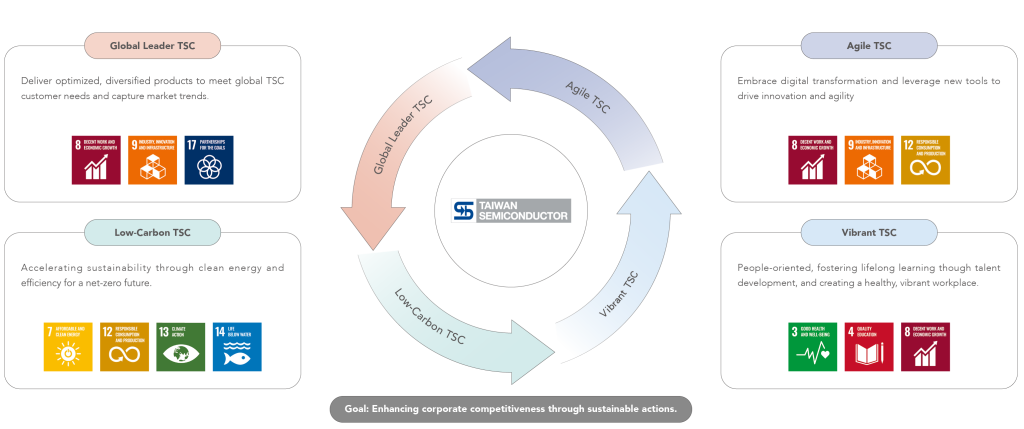Sustainability
Sustainability
Message from the Chairman
The year 2024 marked a pivotal moment in the global sustainability landscape. That year, economic development and geopolitical dynamics introduced fresh uncertainties into the climate agenda. The ongoing Russia–Ukraine conflict not only triggered a humanitarian crisis but also intensified risks related to energy security and carbon emissions. With extreme weather events occurring more frequently, 2024 is projected to become the hottest year in recorded history—ushering in what many now call the “era of global boiling.” Yet, despite these daunting challenges, the world continued to push forward with sustainability efforts. The Paris Olympic Games adopted a vision of carbon positivity, redefining low-carbon standards for major global events. In Taiwan, the launch of the national carbon trading platform in October marked a critical milestone in voluntary emissions reduction and the realization of real carbon pricing.
Against this backdrop of intersecting global transformations and environmental urgency in 2024, TSC advanced its sustainability governance efforts, reinforcing both organizational resilience and corporate responsibility. Centered around four strategic pillars—deepening core business, accelerating low-carbon transition, strengthening governance, and fostering environmental inclusiveness—TSC is methodically building the essential capabilities for sustainable operations.

Global TSC: Expanding Core Business and Global Reach
Since its founding in 1979 in Yilan, TSC has grown into a global enterprise, firmly rooted in technology leadership. Over the years, we have expanded into diverse markets including automotive, industrial control, and consumer electronics. In 2024, we reorganized R&D resources around core product lines, establishing dedicated R&D teams for each key product to accelerate innovation. Leveraging our in-house chip design capabilities and automated assembly advantages,
we continued advancing development in Schottky rectifiers, fast recovery epitaxial diodes (FRED), transient voltage suppression (TVS) diodes, MOSFETs, ESD protection components, and low dropout/low power automotive regulators. These efforts aim to create a diversified, differentiated, and highly competitive product portfolio.
Low-Carbon TSC: Driving Emissions Reduction and Green Transition
In response to the global net-zero movement, TSC launched a series of low-carbon transformation initiatives. In 2024, we completed our first full disclosure under the international CDP Climate Change and Water Security questionnaires and initiated a climate risk quantification project aligned with TCFD principles, evaluating the operational impacts of potential carbon costs. We also progressed toward our 2030 carbon management roadmap, integrating group-wide GHG inventory data and preparing for the implementation of ISO 14067 product carbon footprint standards. At the same time, we began formulating a renewable energy strategy to support Taiwan’s 2050 net-zero goals and meet customer demand for sustainable product solutions.
Agile TSC: Enhancing Governance and Organizational Resilience
In 2024, TSC elevated its “ESG Committee” to a functional committee under the Board of Directors, further embedding sustainability into corporate governance. In information security, we completed full implementation of the ISO 27001 management system and conducted in-person training to raise internal cybersecurity awareness. Governance improvements continued with board structure optimization and enhanced transparency. The proportion of female directors reached 28%, underscoring our commitment to gender diversity. Additionally, TSC ranked within the top 6%–20% in Taiwan’s corporate governance evaluations, reaffirming our dedication to integrity-based management.
Vibrant TSC: Fostering an Inclusive and Healthy Workplace
At TSC, we believe our employees are the company’s most valuable asset. We continue to strengthen feedback mechanisms and have introduced competency-based modules alongside diverse training programs to support personal development and organizational growth. TSC has maintained zero occupational disease cases for three consecutive years and, in 2024, received the “Healthy Workplace Promotion Certification” from the Ministry of Health and Welfare,
demonstrating our commitment to a safe and supportive work environment. Our dedication to social responsibility is also reflected in community engagement efforts, including our annual blood donation campaigns across three facilities, initiatives to encourage donation of vouchers and receipts, and sponsorship of local arts and culture groups—each a testament to our long-standing commitment to public welfare and cultural sustainability.
In the face of increasingly complex global developments, TSC will continue to expand its global footprint, accelerate the low-carbon transition, reinforce governance resilience, and cultivate a more inclusive workplace culture. We will respond to challenges with tangible actions, continuously strengthening our organizational adaptability and long-term sustainability. With openness and collaboration, we look forward to forging strong partnerships with stakeholders as we stride confidently into the future.
Chairman Wang Shiu-Ting
© Copyright 2026 Taiwan Semiconductor Co., Ltd.
- Cookie Settings
- Website Feedback
- Privacy Policy
- Terms of use
- Terms & Conditions


